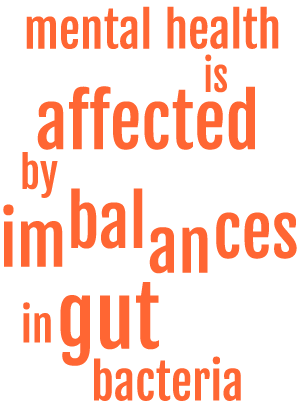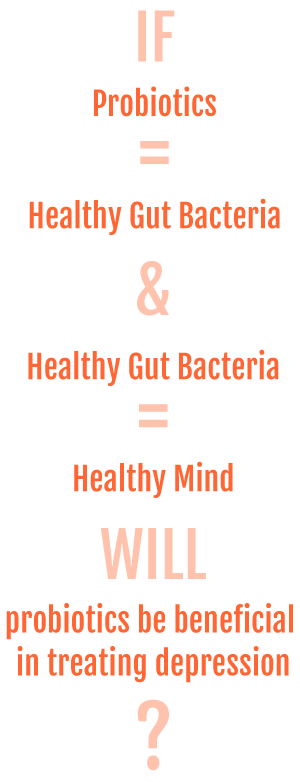Food for Thought

A new research project in Sydney is investigating whether the type of food we eat could prove to have an affect on our mental health.
A team of psychologists at the Mental Health Interventions and Translational Psychology Research Centre (MHIT-Psych) are in the process of recruiting people with a history of depression to investigate the potential benefits of probiotics on an individual’s mental health.
Probiotics are substances which people can consume, and contain live bacteria that can add to the balance of ‘good’ bacteria, which already live in our gut. Many different types of bacteria live inside us but fermented foods, such as yoghurt, also contain additional probiotics to support our bodies.
 Dr Lynette Roberts, a psychologist and lecturer in clinical psychology from the University of Technology Sydney, is leading the trial. She says gut bacteria have a large influence on our general well being.
Dr Lynette Roberts, a psychologist and lecturer in clinical psychology from the University of Technology Sydney, is leading the trial. She says gut bacteria have a large influence on our general well being.
“Gut bacteria are a diverse community of microorganisms that live in our intestinal tract. They help us digest food, support the growth of beneficial bacteria in the gut, communicates with the immune system, and influences brain function. In general, we can see that improving your gut health through probiotics helps people feel less worried and stressed.”
In the last few years, scientists have found increasing evidence that gut bacteria could have an influence on human mental health, with ongoing research on probiotics focusing on its potential alleviation of anxiety and depression symptoms. Potentially, the microbiome (the range of gut bacteria in the stomach) could be related to the state of an individual’s mental health.
While there have been controlled tests on the anxiety levels of rodents based on their probiotic consumption, scientists are yet to delve into trials on human subjects.
In an interview with online health website Prevention.com[1], George Washington University psychiatrist Thomas Wise says there are exciting possibilities in the field.
“There is an emerging research literature that is compelling. So you can’t say the microbiome is hocus-pocus. Gut bacteria affect the brain in many ways. But how does that relate to depression? The human data is minimal.”
Based at the MHIT-Psych lab on the UTS campus, Dr Roberts and her team are at the forefront of new research into the relationship between probiotics and mental health.
“The relationship between gut and mental health is a new, and quickly expanding area. We know that probiotics reduces anxiety and depression in rats, similar to anxiolytics and antidepressants,” she says.
“People that don’t have an emotional disorder also feel less worried and stressed. It’s not just changes in thoughts/behaviours/emotions though, as we also see beneficial changes in the body and the brain. For instance, probiotics reduces cortisol levels, which are stress hormones in the body.”
“We do know that people with gut health problems such as inflammatory bowel disease (IBS) are more likely to have anxious and depressive symptoms, suggesting that there is a relationship between the health of the microbiome and having emotional difficulties.”
 Every person has a microbiome that is unique to them, and what may be healthy for some may not be so healthy for others. However, Dr Roberts says probiotics are substances that are beneficial for everyone.
Every person has a microbiome that is unique to them, and what may be healthy for some may not be so healthy for others. However, Dr Roberts says probiotics are substances that are beneficial for everyone.
“Your microbiome is unique, like a fingerprint,” she says.
“It can be influenced by a number of factors, like your genetics, diet, lifestyle and antibiotics. If there’s an imbalance in gut bacteria, people can have digestive issues like bloating or constipation, which could benefit from probiotics.
“Probiotics in general are very safe and well tolerated, with minimal side effects, but they’re not recommended for people who have a compromised immune system. It’s always a good idea to chat with your doctor first.”
There is enormous potential in this research, as probiotics may prove to be an alternative to mental health medication. Dr Roberts is excited about the possibilities probiotics present.
“We have very good psychological and pharmacological treatments, however, not everyone will benefit, and medication side effects can be common. A big barrier to seeking treatment in the first place is perceived stigma,” she says.
“Probiotics have the potential to be a low-stigma, low-cost and well-tolerated supplement that could enhance current depression treatments, or offer a non-medication alternative for people with milder symptoms of depression.”
This research is one of many trials being undertaken across the world and could prove to be a game-changer for the mental health sector.
FIND THEM ON
https://www.facebook.com/MHIT-Psych-1012695645485130/
[1] http://www.prevention.com/mind-body/probiotics-antidepressants
Back to most recent edition
Newsletter
Stay up to date
Sign up to our Mind Reader newsletter for monthly mental health news, information and updates.